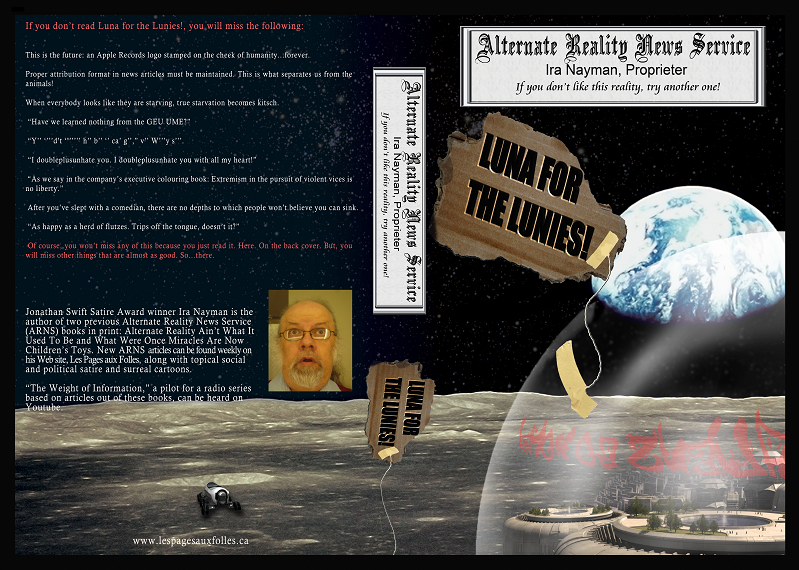by INDIRA CHARUNDER-MACHARRUNDEIRA, Alternate Reality News Service Fine Arts Writer
Were rabbits rascally? Other than a few cartoons from the mid-20th century, there is no evidence that rabbits were capable of running a hoedown or talking hunters into shooting themselves. Unfortunately, in the absence of rabbits, this question may never conclusively be answered.
The Great Ecological Unpleasantness (GEU) that led to the Unfortunate Mass Extinction (UME) of animal species has left lexicographers with a problem: how many phrases that involve animals were metaphorically intended and how many reflected the reality of the animals they referred to?
“Strong as an ox?” mused lexicographer and part-time shower curtain Subhashan Withanage. “Who knows how strong an ox used to be? As strong as one Volkswagen? Four? Eleven? And, what about busy as a beaver? With no examples to study, how would we know how busy beavers actually were? It’s not like we can check the datebook app on their BlackBerries! I mean, really! – for all we know, beavers could have been the laziest members of the animal kingdom!”
Withanage is one of a number of renegade lexicographers who believe that English majors should take the bull by the horns (they’re pretty sure that bulls had horns) and shape the language to better reflect current zoological reality. This would require retiring with extreme prejudice phrases that no longer make sense and replacing them with ones that do.
“We’re not saying we would toss a bunch of new phrases into the language like geese in a thresher,” Withanage explained. “That would be inhumane.”
What the renegade lexicographers propose is to tag new phrases before they are introduced into the wild and see how they travel through populations as their popularity grows. This would allow the lexicographers to determine which worked and which didn’t, and to shape future phrases accordingly.
“It…it’s kind of like how they used to tag and follow wild animals…when there were wild animals,” Withanage commented as if he had just come upon the thought, although his delivery was a little too studied to convince me that he hadn’t been working on it all afternoon.
“Oh, good luck with that!” snorted Skeezix Maguffin, a populist lexicographer (who, oddly enough, does not have an eccentric obsession or humourous hobby). The populists prefer to let the language run its course, with “phrases disappearing naturally, not unlike soap bubbles on a stagnant pool of water or actresses over the age of 40.”
Populist lexicographers point out that, because there are so few animals left, they would have to be used so frequently in phrases that the true natures of the animals would be lost. To use one example, there would have to be 287 phrases using a mule, including: “Dumb as a mule,” “Critchety as a mule,” “Brash as a mule,” “Lewd as a mule,” “Defensive as a mule,” “Otiose as a mule,” “Playful as a box of mules,” “Troublesome as a mule wearing mules in a sandstorm” and “The Mule doesn’t go all the way up the tower, if you know what I mean.”
“One animal cannot be all of these things,” Maguffin argued. “Especially a mule. I mean, have you ever seen mules? Pathetic creatures – and, no, when I say that, I’m not suggesting another phrase for them to be part of!”
Renegade lexicographers point out that this is a temporary situation, since scientists are creating new species that could work their way into the language. “As happy as a herd of flutzes,” Withanage said. “Trips off the tongue, doesn’t it?”
“Like a lead rhinoceros!” Maguffin interjected.
“A lead flutz,” Withanage corrected her.
Maguffin argued that there was no necessary correlation between a flutz and any of the qualities it might be purported to have in new phrases. Withanage countered that there was no provable correlation between extinct animals and the qualities they are purported to have in old phrases, so it’s all a bit of a wash, isn’t it? Maguffin conceded the point, but insisted that letting the old phrases die out naturally was a better option.
“Have we learned nothing from the GEU UME?” she cried.
“You’re just being stubborn as a flutz,” Withanage responded.
“Mule!” Maguffin shouted. “Stubborn as a mule!”
“Someone’s got a flutz in her bonnet,” Withanage whispered. Not low enough, however, as Maguffin threw a frying pan at him. “Humph! Mad as a march flutz,” he added before he passed out.
Robert Hartwell Fiske was unavailable for comment.


